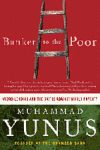 The winner of the 2006 Nobel Peace Prize is Muhammad Yunnus. He was chosen for the enormous impact he has had on third-world poverty at the village level. The Nobel committee described him as a “liberating force” who has helped to pull tens of millions of people (especially women and children) out of poverty. All this is true, and yet Yunnus has been a controversial choice since he is a capitalist, a businessman, the head of a bank which turned a profit of $15 million last year.
The winner of the 2006 Nobel Peace Prize is Muhammad Yunnus. He was chosen for the enormous impact he has had on third-world poverty at the village level. The Nobel committee described him as a “liberating force” who has helped to pull tens of millions of people (especially women and children) out of poverty. All this is true, and yet Yunnus has been a controversial choice since he is a capitalist, a businessman, the head of a bank which turned a profit of $15 million last year.
But Yunnus’ Grameen Bank is no ordinary lending institution. Is specializes in micro-lending. In 1976, Yunnus, a young, Vanderbuilt-trained economist found himself back home in Bangladesh, wanting to make a difference. He knew that traditional banks never lent money to most working class and rural Bangladeshi’s who found themselves virtually enslaved to local money-lenders who charged exorbitant rates of interest. He found, after extensive research, that most families could get out of debt, and on strong financial footing for about $27. He put together a plan to manage an appropriate micro-lending operation, but no traditional bank, large or small, would participate. So he started with money from his own pocket. The folks who received the small sums, at moderate rates of interest, climbed out of poverty, educated their children, and paid the money back on time. His efforts grew and now, Grameen Bank, which specializes in small loans to seamstresses, taxi-drivers, farmers, tinkers, and peddlers is one of the most successful in Southeast Asia.
His work has inspired others. Nancy Barry, once head of the World Bank, whose average loan was for $250 million, left that organization to head Women’s World Banking whose average loan is $250, because she realized that “small entrepreneurs create wealth, and together, do more to end poverty than all the top-down welfare programs combined.” As an American, I think Thomas Jefferson, Benjamin Franklin, and John Adams would be pleased by all this; and although I’m not sure what He might think about interest rates, as a Christian, I think this is the kind of thing Jesus would approve as well.
Our experience in India through the work of our missionary, Jerris Bullard, has been quite similar. Instead of building large institutions, the focus has been on local schools (KCMBIs), digging wells, small elder-care facilities, providing bicycles and sewing machines – with enormous results – evangelistic results: more than 100,000 baptisms a year.
We should not be surprised – it is the small gesture, done in selflessness and love, that always yields the large results, while titanic efforts rarely fail to sink. Jesus is the one who teaches us the value of offering just a cup of water (Matthew 10.32), of caring for “the least of these” (Matthew 25.40), and who showed that when one little boy shares his lunch freely, a crowd of thousands can be fed.
Of course that last example I gave, the feeding of the 5000, which is recorded in all four gospels (Matthew 14, Mark 6, Luke 9, and John 6), is miraculous – but that makes it no less a paradigm. The challenges of the Gospel are as “macro” as can be – involving “all the world,” and “every nation” (Matthew 28 18-20). Jesus, in beginning to tackle this enormous challenge, started micro – with 12 apostles, whom he sent preaching without any “stuff” to hinder them – only the message, and their faith (Matthew 10). Those 12 were two hundred before Pentecost, and 3000 after it - and this before the explosive growth really began. As we read Acts we know that growth was not the result of a media-blitz and a great marketing campaign. It happened from village to village, and from house to house.
We are fond of the large gesture, of the grand scheme, and it is easy to know why. The grand gesture, the big organization with its attendant bureaucracy, allows for detachment and a diffusion of responsibility. No one has to get their hands dirty or be ultimately responsible for anything. How convenient. How worthless.
“Whatever your hand finds to do, do it with all your might…” Ecclesiastes 9.10
We have been told to act – to do what is before us to do. That gesture may be small – as small as offering a cup of water, or sharing your lunch, but God makes it as large as it has to be. The small gesture, genuine and selfless, IS the large gesture. Micro is macro.

